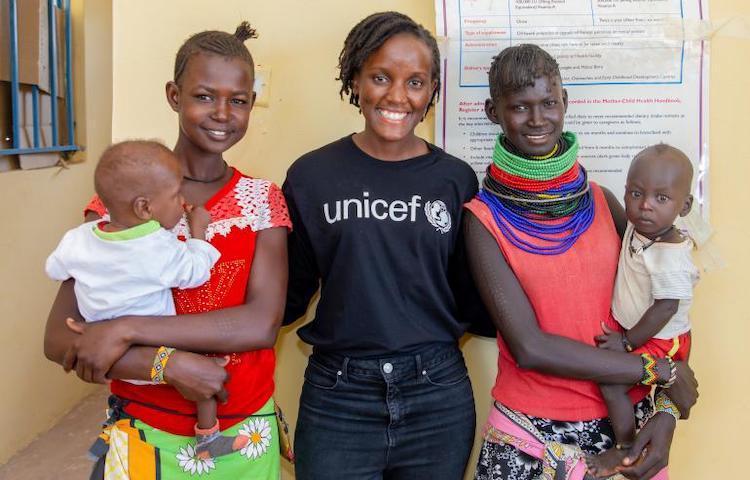By Lisa Vives, Global Information Network
NEW YORK (IDN) — A Black climate activist, who found her picture snipped out of a news photo of young environmental activists (all white) at a U.N. confab, is finally getting a serious platform for her important work.
Vanessa Nakate, the Ugandan-born fighter for climate protection has been selected by UNICEF, the UN aid and development agency for children, to travel around the continent as their new goodwill ambassador. Other ambassadors included Serena Williams, popular actor Amitabh Bachchan, and Katy Perry.
In her first trip with UNICEF, she met with communities on the frontlines of the climate crisis, including mothers and babies receiving lifesaving treatment for severe acute malnutrition and families benefiting from solar-powered water supply systems.
Back in January 2020, an Associated Press photographer cropped Nakate from a picture of youth climate activists at the World Economic Forum in Davos, Switzerland, leaving her friend Greta Thunberg and three other white young women in the shot.
It triggered widespread outrage, rightly so, but Nakate regards that very personal experience as a symbol of how the voices and experiences of Black, Brown and Indigenous communities are routinely erased.
“Africa is on the frontlines of the climate crisis but it’s not on the front pages of the world’s newspapers. Every activist who speaks out is telling a story about themselves and their community, but if they are ignored, the world will not know what’s really happening, what solutions are working,” said Nakate.
This year, Africa has been the scene of multiple climate disasters. Drought in East Africa has worsened following consecutive failed rainy seasons combined with heightened conflict, related population displacement, and COVID-19 restrictions. More than 58 million people are in conditions of acute food insecurity, especially Ethiopia, Somalia and parts of Kenya.
In Uganda, at least 29 people died and thousands were displaced in the city of Mbale in eastern Uganda after heavy rainfall caused two rivers to burst their banks, submerging homes, shops and roads, and uprooting water pipes.
Glaciers in Mount Kenya (Kenya), Mount Kilimanjaro (Tanzania), and the Rwenzoris Mountains (Uganda) are retreating at a faster rate than the global mean.
Many parts of Northern Africa experienced extreme heat, especially in Tunisia, Algeria, Morocco and Libya. This was accompanied by wildfires. Sand and dust storms were a recurring problem.
Turkana, one of the areas in north-west Kenya most affected by a prolonged drought that has left more than 37 million people in the greater Horn of Africa on the brink of starvation, hasn’t had rain in two years.
“To experience what that means in a community, to see how much people are suffering and how much help they need, I really got to see how the climate crisis is affecting so many lives and destroying so many livelihoods, and that it’s mostly women and children who are suffering the most,” Nakate said.
According to the World Health Organisation, an estimated 7 million children under the age of five are acutely malnourished in the region, which is experiencing the worst hunger crisis in over 70 years.
“Climate science is clear,” said the World Meteorological Organization in United in Science, a new report. “We are heading in the wrong direction. Without much more ambitious action, the physical and socioeconomic impacts of climate change will be increasingly devastating, “
“We hope her appointment as a UNICEF Global Goodwill Ambassador will help ensure that the voices of children and young people are never cut out of the conversation on climate change,” said UNICEF Director Catherine Russell, “and that they will always be included in decisions that affect their lives.” [IDN-InDepthNews – 19 September 2022]
Photo: Vanessa Nakate, centre, in Turkana County, Kenya with 20-year-old Dorcas Amana and her 20-month-old son Micah Erot and Asinyoni Ekiru with her 14-month-old baby Papos Alos. UNICEF/Translieu/Nyaberi/UN0702702


